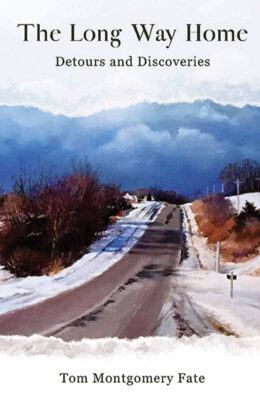
The Long Way Home: Detours and Discoveries
Andrew Taylor-Troutman reviews Tom Montgomery Fate’s new book.
 Tom Montgomery Fate
Tom Montgomery Fate
Ice Cube Press, 168 pages | Published July 15, 2022
In The Long Way Home, Tom Montgomery Fate has written a profoundly moving travel memoir about his experiences across the United States and beyond. He explores not only physical destinations but the interior journey of the soul, inviting readers to consider their own relationships to family and culture.
Fate begins his new book with William Stafford’s poem “Quo Vadis” (Latin for “Where are you going?”). He then travels back in time to narrate the deaths of his father and mother, weaving final scenes with each parent together with childhood memories of fishing and swimming, evoking images of water that flow throughout these early chapters. The author’s grief is evident, yet his journeys into the past ultimately lead to a sense of solace and gratitude for his loved ones.
This book is also about the call to write. Writing is “an act of faith in creation,” and a writer is “accountable” to the past, particularly if, like Fate, one is “a privileged beneficiary” of systemic injustices like race and empire. Fate explores his time in Nicaragua and the Philippines as well as on Native American reservations in the United States. He wrestles with his White privilege and the complicity of his own family members in exploiting other cultures and people. I appreciated how Fate not only holds himself accountable but also lifts up the voices of marginalized leaders, including people of faith. He admires liberation theologians, such as Padre Uriel Molina, for “enacting the radical faith of the Beatitudes, and the Sermon on the Mount, and all those other Bible verses I had read so many times” (author’s emphasis).
Fate is a masterful writer. His prose is simple and elegant like a mathematic formula or ballerina’s twirl. One paragraph will cut into the reader’s heart with incisive analysis of cultural privilege; the next will wrap you in warm feelings like a hot towel at a spa. He pays close attention to words, foreign ones in particular. For example, he builds a lesson on the Filipino word “banal,” which means “holy.” Reflecting on the difference to the same word spelled in English, Fate pens this gorgeous prose in praise of the Filipino culture:
“My students and friends … were trying to teach me to live in the present tense, to pay compassionate attention to the world, to listen and see carefully enough to discern the possibility of the extraordinary in the seemingly ordinary, to hear the sacred music in the off-centered wooden rumble of two wagon wheels, and a slow, cloppity ox, pulling a rice farmer and his son back to their land, back to that raw green rectangle of life.”
Fate ends his story in central Oregon’s Andrews Forest, where he returns to Stafford’s poem: “Is there a way to be gone and still/ belong?” The true journey is to belong like “that bottomless moment when rushing water finally reached the ocean, and suddenly, yet completely, becomes a part of the whole.” While never preachy, Fate is a spiritual guide for anyone with ears to hear.

